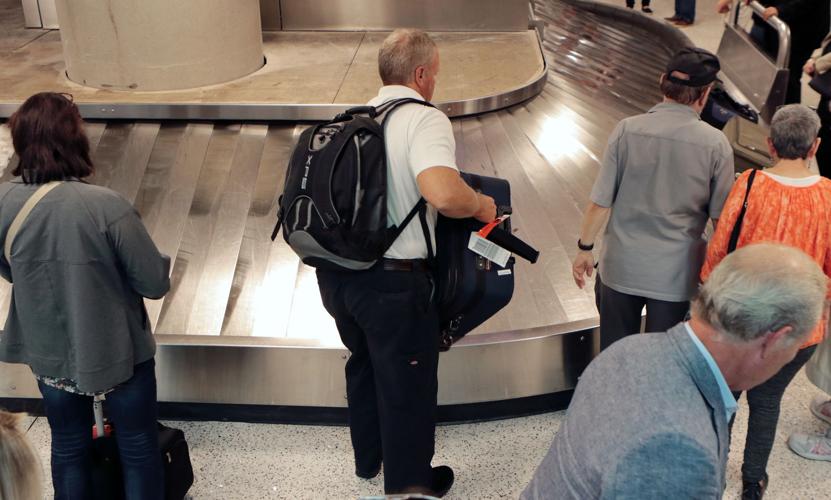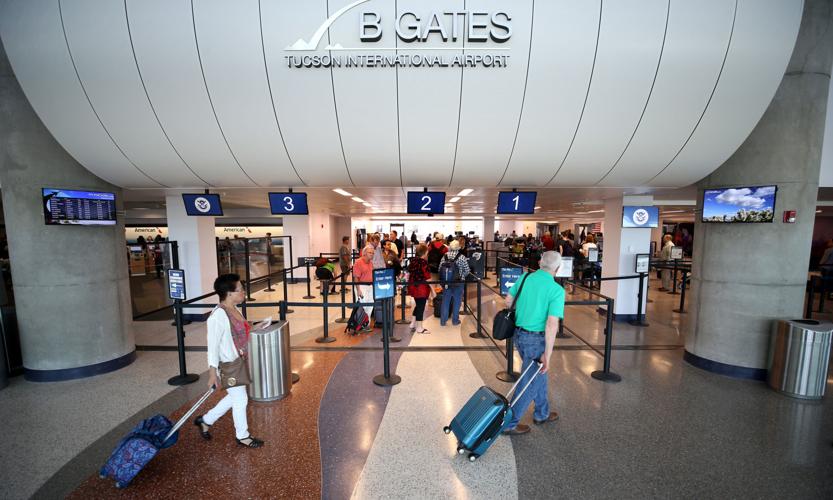For many passengers at the Tucson airport, waiting at the baggage claim is the last stop before heading home.
But the baggage claim area also is where federal agents watch for passengers they suspect are working as money couriers for drug traffickers. In the past three years, those efforts netted $555,000 in seized cash at Tucson International Airport, according to Pima County Superior Court records.
In nearly all the 30 seizures at the Tucson airport since October 2014, Drug Enforcement Administration agents approached passengers as they walked through the baggage claim area, questioned them about their travel plans, and took cash from their suitcases, backpacks, purses, eyeglass cases and pockets.
DEA agents did not arrest anyone when they seized their money, according to court records. Instead, the agents handed the passengers a receipt and sent them on their way. All but one seizure was done without a warrant. No drugs were found, other than small amounts of marijuana in two cases.
In many cases, agents wrote in affidavits that they approached passengers after DEA offices in other cities told them about passengers making last-minute, one-way ticket purchases and not checking bags. Those traits fit the profile of money couriers developed since agents first started seizing cash from passengers at the Detroit airport in 1975.
The Tucson passengers suspected of being couriers included an 18-year-old man from New York carrying $19,000; a 30-year-old mother of two small children from Iowa with $12,000; a 42-year-old woman who worked in fast food in Tucson with $7,000; and a 33-year-old Texas man who worked at a retail clothing store carrying $8,000.
The Arizona Daily Star is not using the names of people whose money was seized if they were not charged with a crime.
In one incident in April 2016, a DEA agent seized $15,000 from a 37-year-old Hermosillo, Sonora, resident, one of four passengers from Mexico involved in the 30 seizures at the Tucson airport.
An agent wrote in an affidavit that the man was suspicious because he bought a one-way ticket the same day from Boston to Tucson and did not check any luggage.
The man also did not pack what the agent thought was enough clothes for the trip and the man said the backpack he was carrying didn’t belong to him, nor did the bank slips showing $18,000 in deposits the previous month.
The man told agents he went to Boston to buy a Jeep Cherokee, where he said they were cheaper than in Hermosillo or Tucson, but did not end up buying one.
That seizure was one of 17 made by DEA agents at the airport in 2016, which was more than double the seven seizures in 2015. So far in 2017, three cases were filed in Pima County Superior Court. However, the lag between seizing money and filing court documents can be six months or more as prosecutors go through the asset forfeiture process.
In August 2016, a 44-year-old North Carolina man bought a last-minute ticket to Tucson and did not check any bags. A background check showed he had been arrested several times for trafficking marijuana and cocaine.
A DEA agent made eye contact with the man, who appeared nervous as he walked through the baggage claim area. When the agent started questioning him, the man said he was visiting friends and family in Tucson.
He denied the agent’s request to search his bag, but after a police dog alerted to the odor of narcotics the agent called a superior court judge to obtain a search warrant. The agent then found small pieces of marijuana and $16,000 in the bag.
In July 2016, a 35-year-old Mesa woman bought a one-way ticket from Detroit to Tucson the same day as the flight and did not check any bags. A DEA agent questioned her about her travel near the baggage claim.
She said she spent the weekend with her boyfriend in Detroit and planned to take a shuttle to Phoenix. She let the agent search her purse, where he found about $4,500. The agent found more cash inside a plastic bag that also contained dryer sheets, which he wrote are used to thwart police dogs. The agent seized $7,300 from her, which she said came from her savings. She was considering using it to buy a place to live in Detroit with her boyfriend.
How it works
The seizures, which ranged from $3,000 to $95,000, were made under Arizona’s anti-money laundering laws by DEA agents flanked by other members of the Counter Narcotics Alliance, a multiagency task force that includes local police and other federal agencies like the Border Patrol, court records show.
The DEA declined a request for an interview. Erica Curry, a spokeswoman for the DEA office in Phoenix, provided emailed responses to questions.
Just as drugs from Mexico often “land in Arizona” before being distributed throughout the United States, Curry wrote, drug sale proceeds return to Arizona before being smuggled into Mexico.
After drugs are smuggled across the border into the United States, they are stored in stash houses for a short time, a DEA agent wrote in court documents. As a result, East Coast buyers often buy last-minute plane tickets to send couriers to make the purchase.
When buyers and sellers have an established relationship, couriers often are entrusted with $20,000 or more each trip, the agent wrote. Couriers who work on their own or with a small group of traffickers tend to travel with less than $20,000.
At the Tucson airport, 25 of the 30 seizures involved less than $20,000, court records show.
The seized money is split between the Counter Narcotics Alliance, which received about $380,000, and the Pima County Attorney’s Office, which received $70,000, court records show. About $50,000 was returned and another $50,000 was still going through the forfeiture process.
Scope unclear
The overall scope of the DEA’s operation at the Tucson airport is unclear due to a discrepancy between local court records and DEA records.
The forfeiture unit at the county attorney’s office provided case numbers to the Star that showed $555,000 seized through 30 incidents at the Tucson airport since October 2014.
But the DEA’s Freedom of Information Act office reported $2.1 million seized in 20 incidents since 2007, which comes to 10 fewer seizures than local court records show since 2014.
The discrepancy could not be cleared up by the DEA’s FOIA office, the agency’s Phoenix office or a search of federal court records.
Nationwide, DEA agents seized $163 million in about 4,100 seizures at transportation facilities during 2009-2013, according to a 2015 report from the Department of Justice’s inspector general.
In August 2016, USA Today cited Justice Department records putting the total at $209 million from 5,200 seizures at 15 airports in the previous decade.
The 80,000 seizures of all kinds made by DEA agents across the country came to more than $4 billion during fiscal years 2007-2016, according to a March report from the inspector general. Nearly 90 percent of the seizures involved less than $100,000 and totaled $1.24 billion.
More scrutiny
Seizures of cash and property by law enforcement face increasing scrutiny in Arizona and dozens of other states.
A former Pima County Sheriff’s Department official was sentenced to probation after an FBI investigation of the department’s use of seized assets.
In June, Sheriff Mark Napier requested the Arizona Attorney General’s Office investigate the department for any further misuse of those funds.
The FBI investigated the use of seized funds by the Pinal County Sheriff’s Office earlier this year, which was followed by a federal grand jury investigation in May. And the Legislature recently raised the bar for justifying seizures.
However, Curry and Kevin Krejci, the supervisor of the forfeiture unit at the Pima County Attorney’s Office, said the new law’s effect on seizures at the Tucson airport is uncertain and likely won’t become clear until a seizure is challenged in court.
The 2015 justice department report said 21 percent of the seizures from 2009 to 2013 were challenged and in 41 percent of those challenges all or a portion of the cash was returned, for a total of $8.3 million.
To safeguard against violations of civil rights, Curry said special agents undergo extensive training, including legal training, before they are authorized to work interdiction operations.
Pima County Superior Court records show three challenges to cash seizures at the Tucson airport since late 2014, including two cases in which all or some of the money was returned.
Pima County prosecutors returned $42,000, along with $10,000 in attorney’s fees, to Colorado resident Majdi Khaleq after he challenged the seizure in court, as the Star reported in March 2016. He was arrested months later in DEA raids of a multistate spice-trafficking ring.
In late 2014, Pima County prosecutors agreed to return half the $12,515 seized from a man and a woman after they challenged the seizure. Court records do not show why the money was returned.
And in a case from early 2015, a Pima County Superior Court judge rejected the request for forfeiture, saying prosecutors had not connected a man’s money to racketeering or drug crimes and no evidence was provided to show such crimes even occurred.
“The County Attorney’s suggestion that an open investigation constitutes probable cause for forfeiture is not well taken,” according to a ruling by Judge Charles V. Harrington.
The forfeiture request was granted after prosecutors included information about a previous cash seizure involving the man at the Phoenix airport and a DEA agent testified.
Seizures at airports also brought more scrutiny to the DEA.
Those seizures were the focus of the 2015 inspector general report, which was compiled after DEA agents subjected a woman to what she called “aggressive and humiliating questioning” while she waited for her flight at an undisclosed airport. No cash was found or seized from the woman, who happened to be a Department of Defense lawyer traveling on government business.
The DEA told inspector general investigators they had no record of the encounter because they do not track encounters where no drugs or money were seized. Agents said they were “unable to document every contact they had because there were too many in a day.”
The report said the seizures raise civil rights concerns due to findings from a 2003 report that found the risk of racial profiling is greater with these encounters than with “contacts based on previously acquired information.”
The inspector general report found the DEA does not collect sufficient data to assess whether the encounters are conducted “impartially or effectively,” and the DEA’s management does not ensure training and operational requirements are clearly established. In response, the DEA said it would convene a working group to discuss ideas for tracking those encounters.





